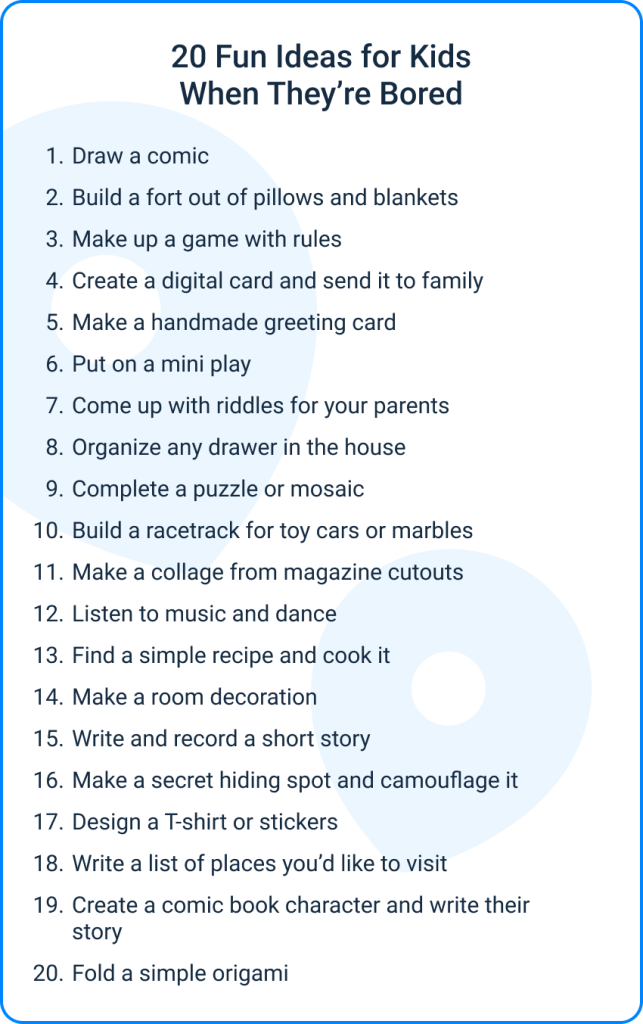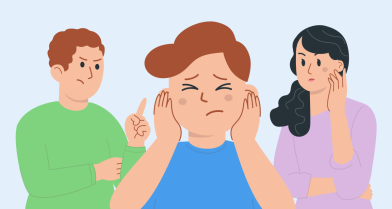Rescue or Not? When Your Child Says “I’m Booored”

You’ve probably heard it before: the cartoon just ended, and suddenly you get a long, drawn-out: “I’m boooored.” Your child wanders around the house, doesn’t know what to do, and asks again for more screen time.
Boredom isn’t just a pause between activities. It’s a space where your child has the chance to come up with something of their own.
Let’s see why kids ages 7–12 often feel bored and how you can support them in this feeling.
Why Kids Get Bored
Boredom happens when the world around them has temporarily lost its novelty, and they don’t yet have enough ideas inside. Kids ages 7–12 are still developing the ability to manage their emotions and plan their actions. Feeling bored at this age is completely normal.
Younger school-age kids don’t yet have enough life experience to quickly think of something to do. They get bored because they haven’t learned how to manage their attention, switch gears, or know what to do when no one is entertaining them.
Why You Shouldn’t Ignore Boredom
Boredom itself is a natural state. But if a child can cope only with gadgets or constant entertainment, it may get harder over time for them to find things to do on their own. That can hold them back from developing initiative, the ability to be alone with themselves, and the skill of finding activities without outside direction.
When a child faces boredom but can’t find ways to manage it alone, it gets harder to handle emotions and stay interested. They might become more irritable or passive, drop projects halfway through, avoid being alone, or not even realize what they truly want. That’s why it’s important to help them experience boredom instead of running away from it.
How to Help a Child Work Through Boredom
- Acknowledge the boredom
It’s okay to be bored. Don’t dismiss it with: “Bored? That’s great!” Instead, say: “You’re bored. That happens.” This gives them grounding and eases anxiety. - Don’t rush to fix it
Give them a pause. Instead of ready-made ideas, ask: “What can you think of yourself?” This sparks thinking and initiative. - Encourage creative activities
Building with Legos, making crafts, drawing, writing stories or comics, experiments, games with rules — all of these help kids invent their own activities and feel confident in their ideas. - Don’t rescue them every time
Even if they wander around saying, “Nothing’s working,” give them time. Sometimes boredom is just the bridge between doing nothing and starting something, and they need to cross it themselves. - Create a “boredom list” for your child
Sit down together and write 10–15 ideas of things to do — both simple and creative. Hang it on the fridge or put it in a drawer for them to reference the next time they feel bored. This way they’ll know the choice is in their hands.
When Boredom Needs Attention
If your child is often bored even in new places and seems listless, irritable, or sad, it may be worth a closer conversation.
Research shows that frequent boredom in children can be linked to trouble managing attention, low motivation, or high anxiety.
In these cases, talk with your pediatrician or a child psychologist. They can help figure out the cause and support your child.
⠀
Boredom isn’t a mistake or a failure. It’s a space where ideas, interests, and inner strength grow. If there’s an adult nearby who isn’t scared of the word “bored,” the child will learn how to handle it, and, in time, even make friends with it.
References
- Boredom proneness and inattention in children with and without ADHD: the mediating role of delay aversion, Frontiers in Psychiatry, 2025
- How Did We Get So Bored? A Bioecological Model of the Development of Boredom, Psychological Reports, 2024
- The kids are bored: Trait boredom in early childhood and links to self-regulation, coping strategies, and parent-child interactions, Journal of Experimental Child Psychology, 2024
- Boredom as the originator of a desideratum — reflections on the creative and suppressive consequences of boredom in the school context, Frontiers in Sociology, 2023
Проверьте электронный ящик




















